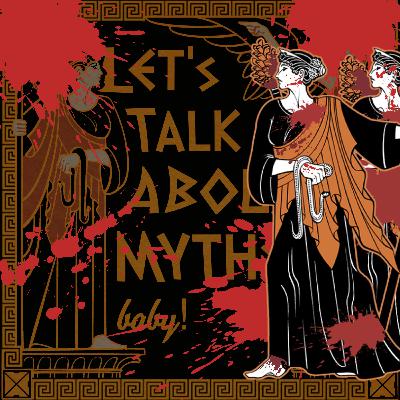
Let's Talk About Myths, Baby! | Greek Mythology & the Ancient Mediterranean
Author: Liv Albert
Subscribed: 21,363Played: 744,850Description
The most entertaining and enraging stories from 'Classical' mythology (and, often, ancient history of the wider Mediterranean!) told casually, contemporarily, and (more often than not) sarcastically. The world of Greek mythology and the history of the wider ancient Mediterranean is full of wonder, horror, and utter hilarity. These myths and stories are timeless for a reason, they're just as relevant today as they were 2500+ years ago. With over 700 episodes and counting, we dive deep into the realm of gods, goddesses, heroes, monsters, and everything in between.
Regular episodes every Tuesday, conversations with authors and scholars or readings of ancient epics every Friday. LTAMB: The Oracle Edition has ad-free episodes and so much more. Learn more about the podcast, and Liv's work, including her book Greek Mythology: the Gods, Goddess, and Heroes Handbook at mythsbaby.com.
Hosted on Acast. See acast.com/privacy for more information.







Loooove your podcast! You got yourself a Persian fan right here ❤️✋🏻
It was good content but unfortunately too much advertisement is annoying and has forced me to look for a similar channel.
Geography of Homer's odyssey- Samuel Butler
The divine comedy- Dante
song of Achilles- Madeline Miller
cerci- Madeline Miller
women & Power - Mary Beard
IGNORE THE SEXIEST IDIOT C:
I love ur content
I'm so baffled by the incels in these comments. Being a feminist means believing men and women deserve to be treated with equal respect. How tf could anyone argue against that? And for everyone whinging about it, imagine how tired women feel
semi related Nemisis fact: there was a shrine to her in the Roman Amphitheatre in Chester. Chester is a city in northern England that still has it's Roman walls. It is speculated to have been intended to become the capital of the British isles, or at least a staging post for the conquest of Ireland.
Thank you but there are too many ads!
This book was such a disappointment to me for much the same reasons you gave. I was so excited about it…and it was such nonsense. I’m glad to hear I’m not alone as almost everyone I have spoken to thinks it’s great. I hated almost everything about it. 🤷🏼♀️
Whether or not Euripides added the epilogue is something we may never know definitively. However, two earlier versions of the story, one from the Cypria and one from Hesiod's Catalog of Women, do not end with the death of Iphigenia by sacrificial blade on the altar at Aulis. The Cypria fragment 1 from the synopsis in Proclus' "Chrestomathia" says: "When the expedition had mustered a second time at Aulis, Agamemnon, while at the chase, shot a stag and boasted that he surpassed even Artemis. At this the goddess was so angry that she sent stormy winds and prevented them from sailing. Calchas then told them of the anger of the goddess and bade them sacrifice Iphigeneia to Artemis. This they attempt to do, sending to fetch Iphigeneia as though for marriage with Achilles. Artemis, however, snatched her away and transported her to the Tauri, making her immortal, and putting a stag in place of the girl upon the altar." Note that this took place the 2nd time the fleet mustered at Aulis. And th
Partheneion is a song/poem to be sung by a chorus of young, unmarried girls. The etymology is from the Greek word for virgin, (Παρθένος Parthenos). The Parthenon is named for the virgin goddess Athena, who like Hestia and Artemis, were perpetual virgins.
One of the reasons the Spartan men "loved" to sing and dance was because music enhanced the precision of their hoplite phalanx formation. On the battlefield they marched together singing in unison to inspire morale and patriotic emotions. And a piper played the aulos to keep time as they moved and turned in lock step. They drilled and practiced to the same music. The role of the Spartan king on military campaigns was to perform religious sacrifices and decide whether or not the signs were auspicious for a Spartan victory. If they were not, the Spartans did not fight that day. While Plutarch may have relied on the Roman re-creation of ancient Spartan practices for his Life of Lycurgus, it is also likely that he relied on other sources which are now lost. Scholars estimate that only 10% of the writings from archaic, classical and Hellenistic Greece have survived to our time. So let's not be too quick to disparage Plutarch. Xenophon wrote the Polity of the Lacedaemonians, a treatise/book
stop with the feministic victim bs already...we don't care about slanted views of reality. just stick with mythology
I looked up the statue that you mentioned in the podcast and from what I saw in the pictures it is really beautiful I can just imagine how beautiful it would be in person definitely going to be on my bucket list now oh and by the way I love the podcast I just found it today and I've been listening to it Non-Stop
Liv, your take is rubbish.
Excellent! and the poem at the end, the best!